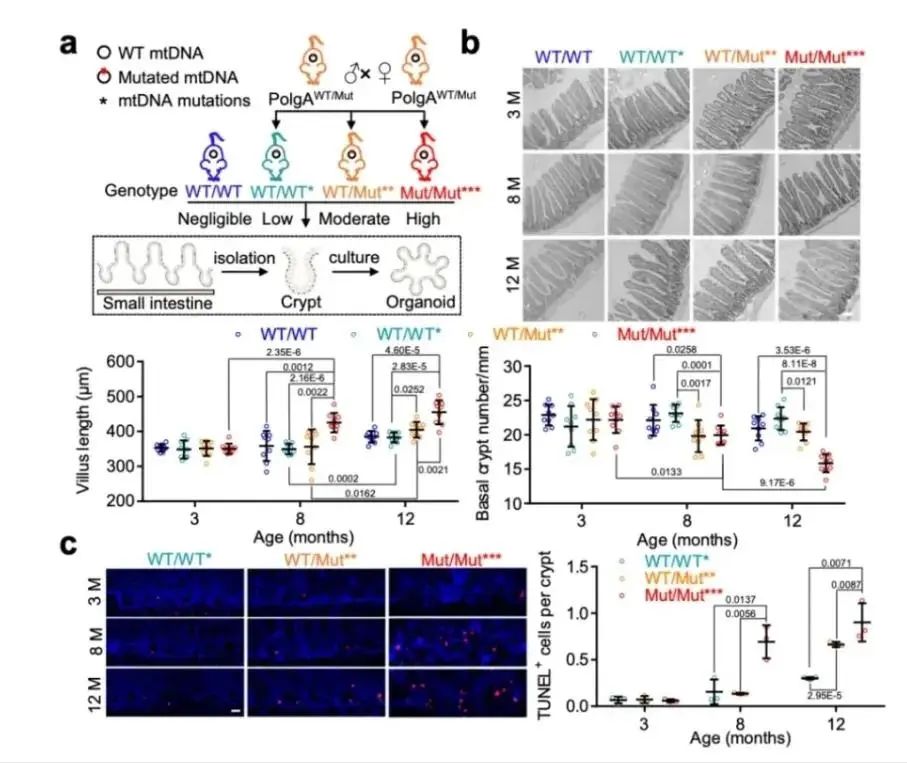
NMN's new research reveals that it may be able to reverse mitochondrial DNA mutations and fight intestinal aging phenomenon of "people's old intestines are old before"
The gut is not only the heart of the digestive system, but also plays the role of the body's largest immune organ.
Once its function is dysfunctional, it will have a wide range of effects on physical and mental health through metabolism, neuroregulation, endocrine and immune systems.
Many scientific studies have revealed that the imbalance of intestinal homeostasis is closely related to the aging process, so there is a saying that "intestinal aging is prior to the overall aging of the human body".
In 2024, a research team from the Key Laboratory of Regenerative Biology of the Chinese Academy of Sciences published research results in the journal Nature Communications, showing that the accumulation of mitochondrial DNA mutations accelerates the aging process of the small intestine.
The supplementation of NMN (β-nicotinamide mononucleotide) can effectively increase the level of NAD+ (nicotinamide adenine dinucleotide), and then reverse the aging phenomenon of small intestine caused by mitochondrial DNA mutation.

01. Mitochondrial DNA mutation accelerates intestinal aging
In 2023 Cel, a leading academic journal, published "12 markers of aging, among which are gut microbial disorders and mitochondrial dysfunction."
Mitochondria, as vital organelles, are known as the "energy factories of cells".
Numerous studies have consistently pointed out that mutations in mitochondrial DNA (mtDNA) are key factors driving aging and a variety of age-related diseases, including several key organs such as the heart, liver, and ovaries, and the aging process in these organs is significantly accelerated by mtDNA mutations.
Similarly, the accumulation of mtDNA mutations has been observed in clinical samples of the intestines of older adults.
The aging small intestine is characterized by a decrease in the number of crypts and an increase in villi length, along with up-regulation of aging marker CDKN1A/p21 and further accumulation of mtDNA mutations.
Using mouse models, the researchers strongly demonstrated that an increased mtDNA mutation burden can induce the small intestine to exhibit an aging-like phenotype.

02. NMN saves intestinal aging
Digging deeper, the research team revealed that mitochondrial DNA mutations lead to severe depletion of NAD+ (nicotinamide adenine dinucleotide) during gut aging.
The decline in NAD+ levels as we age has been widely recognized as an important driver of aging.
This study also found that NAD+ depletion is also associated with the process of intestinal aging.
Numerous previous studies have shown that supplementing NMN, a precursor of NAD+, can effectively increase NAD+ levels, thereby improving the aging state of multiple organs.
Does NMN also have a positive effect on alleviating intestinal aging?
By adding NMN to the diet of mice, the researchers found that the number of intestinal crypts increased significantly and the length of villi was reduced, thereby reducing the small intestine aging phenotype caused by the mitochondrial DNA mutation load.
This finding shows that the loss of NAD+ is indeed a key factor in inducing small intestine aging, and the supplementation of NMN can effectively reverse this aging process, providing new clues for anti-aging treatment of small intestine.
This is not the first time scientists have revealed the positive effects of NMN on gut health.
As early as 2021, it was found that NMN supplementation can regulate the structure of intestinal flora, which is specifically manifested as an increase in the abundance of beneficial bacteria and a corresponding decrease in the abundance of harmful bacteria.
Further, another study in 2023 showed that NMN also showed significant effects in improving intestinal microbiota disorders caused by sleep deprivation, helping to restore specific intestinal resistance.
These findings further confirm the potential of NMN in maintaining gut health.
Previous:Correct consumption method and effect analysis of glutathione
Next:Nothing
- Do you know what are the NMN biosynthesis methods?
- How long does NMN work? Why can't I feel it?
- Anti-aging, resveratrol or NMN which effect is better?
- NMN, Seven Benefits for women
- Uncovering the secret of glutathione
- Why is glutathione so important in the body?
- How does NMN cope with cliff aging?
- From a few hundred to tens of thousands, why is the price gap of NMN so wide?
- Citicoline is a feeding station for the brain
- How does NMN improve sleep quality in the elderly?
